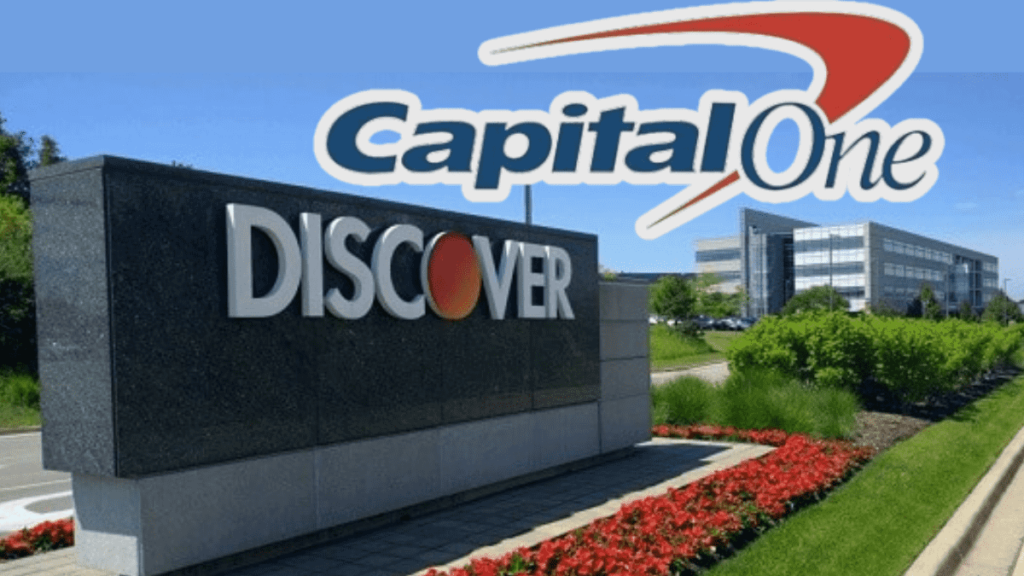In recent news, the financial world has been abuzz with the announcement $35 billion of a potential merger between two banking giants, Capital One and Discover Merger. This groundbreaking move has sparked curiosity and speculation among industry experts, shareholders, and customers alike. In this article, we will delve into the details of this merger, exploring its implications, benefits, challenges, and what it means for the future of banking.

Overview of the Merger Announcement
The merger between Capital One and Discover was officially announced on 20-02-2024, with both companies expressing enthusiasm about the prospect of joining forces. The deal, valued at $35 billion, marks a significant milestone in the banking industry and is expected to reshape the competitive landscape.
Background of Capital One and Discover Merger
Capital One and Discover are well-established financial institutions with a strong presence in the banking sector. Capital One is known for its diverse range of financial products, including credit cards, loans, and banking services, while Discover is renowned for its innovative approach to banking and its popular cashback credit cards.
Reasons behind the Merger
The decision to merge Capital One and Discover is driven by strategic considerations aimed at creating a more formidable competitor in the banking industry. By combining their resources, expertise, and customer bases, both companies aim to achieve greater scale, efficiency, and profitability.
Potential Benefits for Customers
One of the key benefits of the merger for customers is the potential for enhanced products and services. With access to a broader range of financial offerings and improved technology platforms, customers can expect a more seamless banking experience and greater convenience.
Potential Challenges and Concerns
While the merger holds promise for growth and innovation, it also presents challenges and concerns. These may include issues related to cultural integration, regulatory hurdles, and the potential for job losses or branch closures.
Impact on the Banking Industry
The merger between Capital One and Discover is expected to have far-reaching implications for the banking industry. It could lead to increased competition, consolidation among smaller players, and a shift in market dynamics.
Regulatory Approvals and Process
Before the merger can proceed, it must receive regulatory approval from relevant authorities. This process involves a thorough review of the potential impact on competition, consumer welfare, and financial stability.
Future Outlook for the Merged Entity
Looking ahead, the merged entity is poised for growth and success in the competitive banking landscape. By leveraging their combined strengths and capabilities, Capital One and Discover are well-positioned to capitalize on emerging opportunities and drive value for shareholders.
Comparison with Other Bank Mergers
The Capital One-Discover merger will undoubtedly draw comparisons with other notable bank mergers in recent years. By examining past mergers and their outcomes, stakeholders can gain valuable insights into potential challenges and best practices.
Analysis of Stock Market Reaction
The announcement of the merger is likely to have an immediate impact on the stock prices of both companies. Investors will closely monitor developments and adjust their positions accordingly based on expectations for future performance.

Customer Reactions and Feedback
Customer feedback will play a crucial role in shaping the success of the merger. Capital One and Discover must listen to their customers’ concerns, address any issues promptly, and communicate transparently throughout the integration process.
Integration Plans and Timeline
The successful integration of Capital One and Discover will require careful planning, coordination, and execution. Key areas of focus will include technology integration, cultural alignment, and employee training.
Conclusion
In conclusion, the merger between Capital One and Discover represents a significant milestone in the banking industry. While challenges lie ahead, the potential benefits for customers, shareholders, and the broader economy are substantial. By working together, Capital One and Discover have the opportunity to create a stronger, more resilient banking institution that is well-equipped to thrive in an ever-evolving market.
Unique FAQs
- How will the merger between Capital One and Discover impact current customers? The merger is expected to bring about various changes for current customers of both Capital One and Discover. While specific details may vary, customers can anticipate potential improvements in products, services, and overall banking experience. However, there may also be adjustments in terms of account management, customer support, and access to branch locations.
- Are there any anticipated alterations to the rewards programs or benefits provided by Capital One and Discover credit cards? As with any merger, there is a possibility of alterations to rewards programs or benefits associated with Capital One and Discover credit cards. While the exact changes remain uncertain, both companies will likely strive to ensure that any modifications are designed to enhance value for cardholders. Customers can expect transparency and communication regarding any adjustments to their credit card perks.
- What synergies are predicted to emerge from the merger, and how will they be advantageous for shareholders? The merger between Capital One and Discover is anticipated to generate synergies across various aspects of the business, including technology, marketing, and operational efficiencies. By combining resources and expertise, the merged entity can streamline processes, reduce costs, and improve profitability. These synergies are expected to create value for shareholders through increased earnings, enhanced competitiveness, and potential stock price appreciation.
- Are there any apprehensions regarding potential job reductions or branch closures resulting from the merger? While mergers often lead to synergies and efficiencies, they can also result in job reductions and branch closures as redundant positions and locations are identified. As such, there may be concerns among employees and communities about potential layoffs and the impact on local economies. However, both Capital One and Discover are likely to prioritize responsible workforce management and minimize any adverse effects on employees.
- How will the merger between Capital One and Discover be funded, and what repercussions does this hold for shareholders? The merger between Capital One and Discover will likely be funded through a combination of cash, stock, and possibly debt financing. The specific financing structure will depend on various factors, including the valuation of both companies and market conditions. Shareholders may experience short-term fluctuations in stock prices and dividends as the merger progresses, but the long-term implications will largely depend on the success of the combined entity in delivering value and growth.
